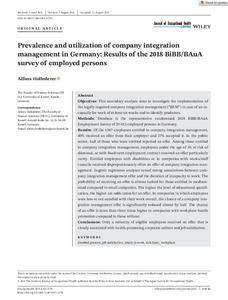| dc.date.accessioned | 2022-02-04T12:27:07Z | |
| dc.date.available | 2022-02-04T12:27:07Z | |
| dc.date.issued | 2021-09-09 | |
| dc.identifier | doi:10.17170/kobra-202201215586 | |
| dc.identifier.uri | http://hdl.handle.net/123456789/13606 | |
| dc.description.sponsorship | Gefördert durch den Publikationsfonds der Universität Kassel | |
| dc.language.iso | eng | |
| dc.rights | Namensnennung 4.0 International | * |
| dc.rights.uri | http://creativecommons.org/licenses/by/4.0/ | * |
| dc.subject | disabled persons | eng |
| dc.subject | job satisfaction | eng |
| dc.subject | return to work | eng |
| dc.subject | sick leave | eng |
| dc.subject | workplace | eng |
| dc.subject.ddc | 300 | |
| dc.title | Prevalence and utilization of company integration management in Germany: Results of the 2018 BiBB/BAuA survey of employed persons | eng |
| dc.type | Aufsatz | |
| dcterms.abstract | Objectives
This secondary analysis aims to investigate the implementation of the legally required company integration management (“BEM”) in case of an incapacity for work of at least six weeks and to identify predictors.
Methods
Database is the representative randomized 2018 BIBB/BAuA Employment Survey of 20 012 employed persons in Germany.
Results
Of the 1367 employees entitled to company integration management, 40% received an offer from their employer and 27% accepted it. In the public sector, half of those who were entitled reported an offer. Among those entitled to company integration management, employees under the age of 30, at risk of dismissal, or with fixed-term employment contract received an offer particularly rarely. Entitled employees with disabilities or in companies with works/staff councils received disproportionately often an offer of company integration management. Logistic regression analyses reveal strong associations between company integration management offer and the duration of incapacity to work. The probability of receiving an offer is almost halved for those entitled in medium-sized compared to small companies. The higher the level of educational qualification, the higher are odds ratios for an offer. In companies in which employees were less or not satisfied with their work overall, the chance of a company integration management offer is significantly reduced almost by half. The chance of an offer is more than three times higher in companies with workplace health promotion compared to those without.
Conclusions
Only a minority of eligible employees received an offer that is closely associated with health-promoting corporate culture and job satisfaction. | eng |
| dcterms.accessRights | open access | |
| dcterms.creator | Hollederer, Alfons | |
| dc.relation.doi | doi:10.1002/1348-9585.12276 | |
| dc.subject.swd | Deutschland | ger |
| dc.subject.swd | Arbeitsplatz | ger |
| dc.subject.swd | Arbeitszufriedenheit | ger |
| dc.subject.swd | Krankenstand | ger |
| dc.subject.swd | Behinderung | ger |
| dc.subject.swd | Betriebliches Eingliederungsmanagement | ger |
| dc.type.version | publishedVersion | |
| dcterms.source.identifier | eissn:1348-9585 | |
| dcterms.source.issue | Issue 1 | |
| dcterms.source.journal | Journal of Occupational Health | eng |
| dcterms.source.volume | Volume 63 | |
| kup.iskup | false | |
| dcterms.source.articlenumber | e12276 | |


